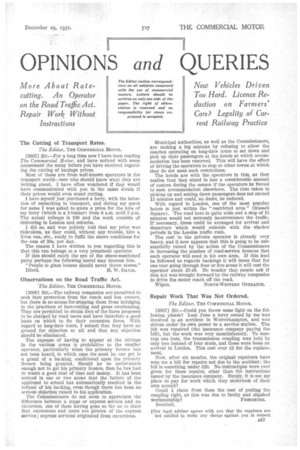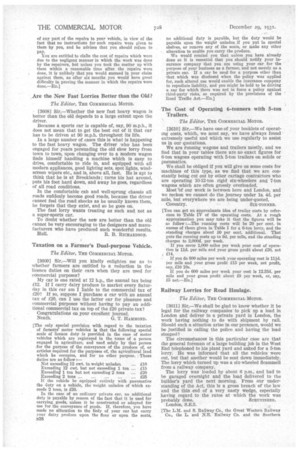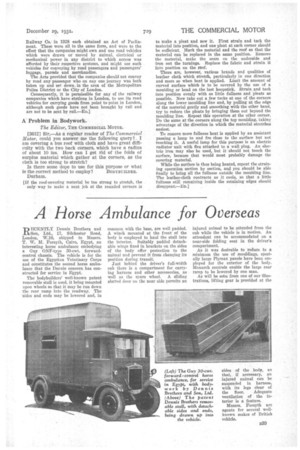OPINIONS and QUERIES
Page 51

Page 52

Page 53

If you've noticed an error in this article please click here to report it so we can fix it.
The Cutting of Transport Rates.
The Editor, Tram COMMERCIAL MOTOR.
[3605] 5ir,—For a long time now I have been reading The Commercial Motor, and have noticed with some amusement the many letters you have received regarding the cutting of haulage prices.
Most of these are from well-known operators in the transport world—men who should know what they are writing about. I have often wondered if they would have communicated with you in the same strain if their prices would even stand cutting.
I have myself just purchased a lorry, with the intention of embarking in transport, and during my quest for same I was asked to quote a price for the hire of my lorry (which is a 1-tonner) from 8 a.m. until 5 p.m. The actual mileage is 100 and the work consists of delivering in London and suburbs.
I did 80, and was politely told that my price was ridiculous, as they could, without any trouble, hire a 2-ton van,. etc., ready to fulfil the above conditions for the sum of 30s. per day.
The reason I have written to you regarding this is that this van belongs to a very prominent operator.
If this should catch the eye of the above-mentioned party perhaps the following moral may interest him. "People in glass houses should never throw stones."
Ilford. H. W. DAVIS.
Observations on the Road Traffic Act.
' The Editor, THE COMMERCIAL MOTOR.
[3606] Sir,—The railway companies are permitted to seek fare protection from the coach and bus owners, but there is no means for stopping them from indulging in the practices of fare-cutting and gross overloading. They are permitted to obtain lists of the fares proposed to be charged by road users and have therefore a good basis on which to fix their excursion fares. With regard to long-date tours, I submit that they have no ground for objection at all and that any objection should be eliminated.
The expense of having to appear at the sittings in the various areas is prohibitive to the smaller operator, particularly when the primary licence has not been heard, in which case the most he can get is a grant of a backing, conditional upon the primary licence being granted. Should he be unfortunate enough not to get his primary licence, then he has had to waste a good deal of time and money. It has been noticed in one or two areas that the failure of the applicant to attend has automatically resulted in the refusal of his backing, even though there has been no serious objection raised to his application.
The Commissioners do not seem to appreciate the difference between a stage or express service and an excursion, one of them having gone so far as to state that excursions and tours are pirates of the express service; express services originated from excursions. Municipal authorities, as well as the Commissioners, are making a big mistake by refusing to allow the coaches operating on long-date tours to set down and pick up their passengers at the hotels at which accommodation has been reserved. This will have the effect of driving the operators to stop at other towns at which they do not meet such restrictions. The hotels are with the operators in this, as they realize that they stand to lose a considerable amount of custom during the season if the operators be forced to seek accommodation elsewhere. The time taken in picking up and setting down passengers does not exceed 15 minutes and could, no doubt, be reduced.
With regard to London, one of the most popular hotels is just within the "restricted area" (Russell Square). The road here is quite wide and a stop of 15 minutes would not seriously inconvenience the traffic. If necessary, times could be arranged for arrival and departure which would coincide with the slacker periods in the London traffic rush. The cost to the private operator is already very heavy, and it now appears that this is going to be substantially raised by the action of the Commissioners in increasing the number of road-service licences that each operator will need in his own area. If this lead be followed as regards backings it will mean that for one tour going through four or five areas it will cost the operator about f5-£6. No wonder that people ask if this Act was brought forward by the railway companies to drive the motor coach off the road.
Wigan. NORTH-WESTERN OPERATOR.
Repair Work That Was Not Ordered.
The Editor, THE COMMERCIAL MOTOR.
[3607] Sir,—Could you throw some light on the following, please? Last June a lorry owned by me was involved in an accident in Wolverhampton, and was driven under its own power to a service station. The job was repaired (the insurance company paying the bill), but the work was very unsatisfactory. To mention one item, the transmission coupling was held by only two instead of four studs, and these were loose on arrival in London. This cost over £2 for the replaCe-.
Now, after six months, the original repairers have sent me a bill for repairs not due to the accident ; the bill is something under £20. No instructiQns were ever given for these repairs, other than the instructions issued by the insurance company. Surely, it is not my place to pay for work which they undertook of their own accord?
Could I claim from them the cost of putting the coupling right, as this was due to faulty and slipshod workmanship? Panorama. Southall.
[Our legal adviser agrees with you that the repairers are not entitled to .make any charge against you in respect
of any part of the repairs to your vehicle, in view of the fact that no instructions for such repairs were given to them by you, and he advises that you should refuse to pay. You are entitled to claim the cost of repairs which were due to the negligent manner in which the work was done by the repairers, but unless you took the matter up with them within a reasonable time after the repairs were done, it is unlikely that you would succeed in your claim against them, as after six months you would have great difficulty in proving the manner in which the repairs were done.—En.]
, Are the New Fast Lorries Better than the Old ?
The Editor, THE COMMERCIAL MOTOR.
[3608] Sir,—Whether the new fast heavy wagon is better than the old depends to a large extent upon the driver.
Because a sports car is capable of, say, 90 m.p.h., it does not mean that to get the best out of it that car has to be driven at DO m.p.h. throughout its life.
In a large number of cases this is what is happening to the fast heavy wagon. The driver who has been engaged for years persuading the old slow lorry from town to town, upon changing over to a modern wagon finds himself handling a machine which is easy to drive, comfortable to ride in, and equipped with all modern appliances, good lighting sets, spot lights, windscreen wipers etc., and is, above all, fast. He is apt to think that he is at 13rooklands; turns his hat around, puts his foot hard down, and away he goes, regardless of all road conditions, In the comfortable cab and well-sprung chassis all roads suddenly become good roads, because the driver cannot feel the road shocks as lie usually knows them, he forgets that they exist, and so he goes on. The fast lorry wants treating as such and not as a super-sports car.
To doubt whether the new are better than the old cannot be very encouraging to the designers and manufacturers who have produced such wonderful results.
Hull. R. B. RICHARDSON.
Taxation on a Farmer's Dual-purpose Vehicle.
The Editor, THE COMMERCIAL MOTOR.
[3609] Sir,—Will you kindly enlighten me as to whether farmers are entitled to a reduction in the licence duties on their cars when they are used for commercial purposes?
My car is one rated at 12 h.p., the annual tax being £12. If I carry dairy produce to market every Saturday in this car am I liable to the commercial tax of £20? If so, suppose I purchase a car with an annual tax of £20, can I use the latter car for pleasure and commercial purposes without having to pay an additional commercial tax on top of the £20 private tax?
Congratulations on your excellent journal. Neath. G. T. HAMMOND.
[The only special provision with regard to the taxation of farmer' motor vehicles is that the following special scale of licence duty is provided in the case of motor vehicles which are registered in the name of a person engaged in agriculture, and used solely by that person for the purpose of the conveyance of the produce of, or articles required for the purposes of, the agricultural land which he occupies, and for no other purpose. Those duties are as follow:— Not exceeding 12 cwt, in weight unladen, £10
Exceeding 12 cwt. but not exceeding 1 ton ... LIP
Exceeding 1 ton but not exceeding 2 tons ... £20 Exceeding 2 tons £25
If the vehicle be equipped entirely with pneumatics the duty on a vehicle, the weight unladen of which exceeds 2 tons, is £20.
In the case of an ordinary private car, no additional duty is payable by reason of the fact that it is used for carrying goods, unless it be constructed or adapted for use for the conveyance of goods. If, therefore, you have made no alteration to the body of your car but carry your dairy produce upon the floor or upon the seats, n38 no additional duty is payable, but the duty would be payable upon the weight unladen if you put in special shelves, or remove any of the seats, or make any other alteration to enable you carry the produce.
We would remind you that unless you have already done so it is essential that you should notify your insurance company that you are using your car, for the purpose of your business as a farmer, and not merely, as a private car. If a car be used for a purpose other than that which was disclosed when the policy was applied for, such altered use would enable the insurance company to repudiate liability, and you might be held to be driving a car for which there was not in force a policy against third-party risks, as required by the provisions of the Road Traffic Act.—End The Cost of Operating 6-tonners with 5-ton Trailers.
The Editor, THE COMMERCIAL MOTOR.
[3610] Sir,—We have one of your booklets of operating costs, which, we must say, we have always found extremely useful and 'which we use regularly to assist us in our quotations.
We are running wagons and trailers mostly, and we find that in your tables there are no exact figures for 0-ton wagons operating with 5-ton trailers on solids or pneumatics.
We shall be obliged if you will give us some costs for machines of this type, as we find that we are constantly being cut out by other cartage contractors who are operating 10-12-ton rigid six-wheelers and 7-ton wagons which are often grossly overloaded.
Most of our work is between here and London, and we reckon we cannot do the journey under Is. 40. per mile, but everywhere we are being under-quoted, Coventry. .SIX-TONNER.
[You can get an approximate idea of trailer costs by reference to Table IV of the operating costs. At a rough approximation you may take it that the figures will be as follow :—The running costs will be 20 per cent. in excess of thosa given in Table I for a 6-ton lorry, and the standing charges about 30 per cent. additional. That puts the running costs up to 90. per mile, and the standing charges to 2,000d. per week.
If you cover 1,000 miles per week your cost of operation is 11d, per mile and your gross profit about £20, net £14.
If you do 800 miles per week your operating cost is Ilid. per mile and your gross profit £15 per week, net profit, say, £10 10s.
If you do 600 miles per week your cost is 12.330. per mile and your gross profit about £9 per week, or, say, 15 net.—En.]
Railway Lorries for Road Haulage.
The Editor, THE COMMERCIAL MOTOR.
[3611] Sir,—We shall be glad to know whether it be legal for the railway companies' to pick up a load in London and deliver to a private yard in London, the work having nothing to do with shipment by rail. Should such a situation arise in our presence, would we be justified in calling the police and having the load stopped?
The circumstances in this particular case are that the general foreman of a large building job in the West End telephoned to his plant yard and asked for a 5-ton lorry. He was informed that all the vehicles were out, but that another would be sent down immediately. The lorry which turned up was a six-wheeled Scammell from a railway company.
The lorry was loaded by about 6 p.m., and had to be garaged overnight and the load delivered' to the builder's yard the next morning. From our under'standing of the Act, this is a gross breach of the law and the thin end of a very nasty Wedge, especially having regard to the rates at which the work was probably done. SCRUTINEER. London, S.E.5.
[The L.M. and S. Railway Co., the Great Western Railway Co., the L. and N.E. 'Railway Co. and the Southern Railway Co. in 1928 each obtained an Act of Parliament. These were all in the same form, and were to the effect that the companies might own and use road vehicles which were drawn or moved by animal, electrical or mechanical power in any district to which access was afforded by their respective systems, and might use such vehicles for conveying by road passengers and passengers' luggage, parcels and merchandise.
The Acts provided that the companies should not convey by road any passenger who on any one journey was both taken up and set down. in the area of the Metropolitan Police District or the City of London.
Consequently, it is permissible for any of the railway companies which have stations in London, to use its road vehicles for carrying goods from point to point in London, although such goods have not been brought by rail and are not to be sent by rail.—ED.] K Problem in Bodywork.
The Editor, TEE COMMERCIAL MOTOR.
[36121 Sir,—As a regular reader of The Commercial Motor, Could you answer me the following query?. I am covering a bus roof with cloth and have great difficulty with the two back corners, which have a radius of about 10 ins. How can I get rid of the folds of surplus material which gather at the corners, as the cloth is too strong to stretch?
Is there some dope to use for this purpose or what is the correct method to employ? BODYBUILDER. Durham.
[If the roof-covering material be too strong to stretch, the only way to make a neat job at the rounded corners is to make a pleat and sew it. First strain and tack the material into position, and one pleat at each corner should be sufficient. Mark the material and the roof so that the material can be replaced in the same position. Remove the material, make the seam on the underside and iron out the turnings. Replace the fabric and strain it into position on the rOof.
There are, however, various brands and qualities of leather cloth which stretch, particularly in one direction and more so when heat is applied. Limit the amount of curved surface which is to be covered by the use of a moulding or bead on the last hoopstick. Strain and tack into position evenly with as little fullness and pleats as possible. Now take out a few tacks at one of the corners along the lower moulding line and, by pulling at the edge of the material gently and smoothing with the other hand, try to reduce the pleats by bringing them out beyond the moulding line. Repeat this operation at the other corner. Do the same at the corners along the top moulding, taking advantage of the direction in which the material stretches easiest.
To remove more fullness heat is applied by an assistant passing a lamp to and fro close to the surface but not touching it. A useful lamp for this purpose is an electric radiator unit with flex attached to a wall plug. An electric iron may also be used, but it should not touch the surface, because that would most probably damage the covering material.
While the surface is thus being heated, repeat the straining operation section by section, and you should be able finally to bring all the fullness outside the moulding line. The leather-cloth contracts as it cools, so that a little fullness still remaining inside the retaining edges should disappear.—End




























































































